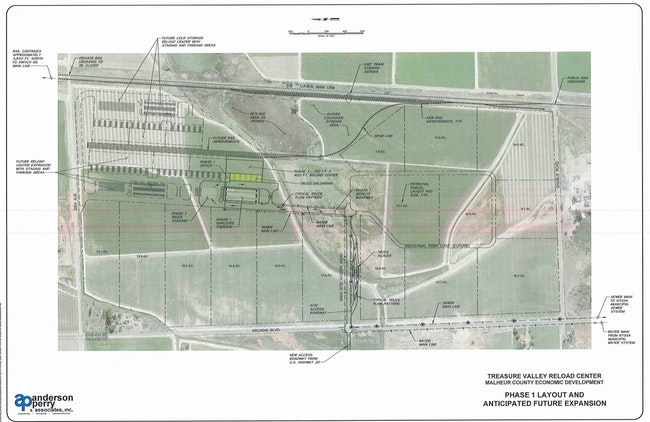
This rendering shows Malheur County’s proposed industrial park next to the Treasure Valley Reload Center. The map was submitted to state officials in December. A new map now shows rail spurs cutting through the industrial lots.
The county agency’s recent declaration seemed like good news.
“We will continue to be transparent and open to questions during the process of building the reload center,” according to a posting by the Malheur County Economic Development Department.
That was on Jan. 13.
Four days later, the same agency sent a note of a different kind to the Enterprise. The newspaper had submitted a new public records request.
“The staff or volunteers necessary to complete a response to the public records request are unavailable,” the agency reported.
The county department provided no indication of when it would share public documents showing why the local railroad, Oregon Eastern Railroad, wasn’t involved in the big rail project. The Enterprise also can’t yet report facts about the county’s plans to buy its own train engine, which can cost up to $2 million.
We wait for the information to share with citizens and taxpayers.
Recently, we asked county officials about a major revision to the rail shipping project that involved two new rail spurs. A map showed the new spurs cutting through the county’s proposed industrial park. Rail work is expensive. We asked about the cost and the effect on the industrial park.
We wait for the information to share with citizens and taxpayers.
And then there is the county’s cost for turning bare ground into industrial property.
We asked about those costs back on Nov. 1, close to three months ago.
The county economic development agency didn’t answer. And we got no answer from County Judge Dan Joyce or Commissioners Larry Wilson and Don Hodge.
In December, the Enterprise discovered that the county had told the state it needed $14 million for that work. We reported that, providing access to the public records the state provided to the Enterprise at no cost.
We asked the county for its records about the matter. We wanted to see what homework had gone into the estimates and where the county planned to get that kind of money.
The Enterprise requested the records from the county’s economic development agency on Dec. 30. A week later, the agency reported it had the records. The cost for the Enterprise to get them: $300.
That’s the last we heard from the agency about that matter, even after we hand delivered a check to the county courthouse.
So, we wait for the information to share with citizens and taxpayers.
We also tried another approach to get at the facts. Our news team noticed that Joyce himself signed paperwork submitted to the state in November that listed the potential $14 million in costs.
“I certify to the best of my knowledge that all the information contained in this document and any supplements is valid and accurate,” Joyce said over his signature.
The Enterprise asked Joyce for records he had to support his statements to the state. He didn’t have any.
“Judge Joyce has no written documents in his possession,” the county told us. “Judge Joyce relied on the oral representations of Malheur County Economic Development and the contractor.”
Joyce’s office said the county economic development agency would need another seven days or so to provide the cost information.
The reason was that an outside consultant, not the county, had some of the public documents that would answer the Enterprise’s request.
That means that the public records requested on Dec. 30 would finally be disclosed about Jan. 20. That day came and went and no disclosure. The entire week passed – no documents.
So, after nearly three months of asking, the Enterprise waits.
We can’t tell you what industrial development is going to cost taxpayers because the county won’t say.
We can’t tell you where millions of dollars will come from because the county won’t say.
And we can’t tell you what’s behind the county’s plan to run its own railroad – at least, own a train locomotive – because the county won’t say.
Government officials are required by law to give the public access to documents. And the Oregon Supreme Court said a half a century ago there is good reason for citizens to see those records.
Access to such information ensures “there will be an opportunity to determine whether those who have been entrusted with the affairs of government are honestly, faithfully and competently performing their function as public servants,” the court said.
Malheur County commissioners and economic development staffers are ducking that duty to disclose.
They’re not just sticking it to the Enterprise.
They’re sticking it to the taxpayers.
Les Zaitz is editor and publisher of the Enterprise and serves on the Oregon Public Records Advisory Council. Email: [email protected].
PS: Your subscription to our online service for $5 a month or a contribution to “Dollars for Disclosure” allows the Enterprise to do this work.
 Les Zaitz, editor and publisher, Malheur Enterprise.
Les Zaitz, editor and publisher, Malheur Enterprise.




